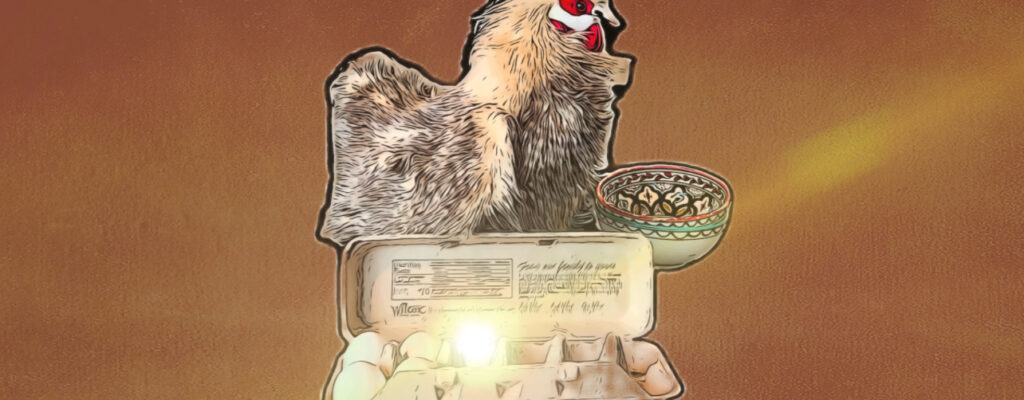With projections by the U.S. Department of Agriculture that eggs will reach a record high of $37 a dozen by Easter, many Americans are foolishly planning to raise chickens. That same group of Americans, concerned that a 24-ounce caramel, creme de menthe, white chocolate powder, butterscotch, English toffee, peppermint, and white coffee will soon cost $79.50, are considering buying their own coffee plantations in South America or Jamaica.
These people tend to be like the stars of Hallmark Channel movies in which highly motivated, successful businesspeople in New York give up their lavish, Park Avenue lifestyles to become florists or cupcake decorators in dinky towns that celebrate every Christian holiday with fruitcakes and covered dishes.
I once fancied myself a chicken farmer. I was in the fifth grade.
My family had deserted the concrete jungle that was (is) the West Side of Chicago for an idyllic plot of farmland featuring waves of tall grasses that could only remind one of Walt Whitman in one of his more romantic moods.
Although our family “farm” wasn’t all that big, it was potentially big enough to install a commercial operation that would give Tyson a run for its money.
I had no notions of such grandeur. In fact, I had never thought about chickens or eggs unless I was about to eat them. What happened was that in the back pages of Boys Life magazine was an advertisement promising untold riches from raising chickens. I was intrigued and I had in hand the three cereal box tops and $3 cash in took to get, if memory serves, three dozen baby chicks. It might well have been four.
After sending off the remittance, I forgot about the chickens. Of course I failed to mention them to my parents.
My mother rarely greeted me from the front porch as I made my way from the school bus. When she did, it was likely that I had done something terribly wrong. One spring day, I saw my mother standing on the front porch. “There’s a package for you on the back stoop,” she said, her voice in an agitated state. “My chickens!” I shouted.
I ran to the back of the house and sure enough, there were three pallets of squeaking yellow chicks. I tore open the packaging and soon the little birds were running frantically around, pecking at the ground and each other. As I recall, it was quite exciting and amusing.
And then I noticed that my father had arrived on the scene. He was less amused than my mother. He ordered me into his car, and drove me to the library where I spent the next few hours reading about chickens.
I don’t remember much about that research assignment. What I do remember is that chickens tend to stay near the first place they learned was their new home—in this case under the clothesline right outside the back door our of house. I also observed that my chickens are nasty little animals that used to scurry about my mother and attack her ankles. She didn’t care for that.
I used to strew a mixture of grains about the yard twice a day. When the grain was consumed, the chickens would spend the time before their next feeding pecking madly at the ground in search of insects and worms.
I learned that it is a long time before baby chicks will grow old enough to start laying eggs, and that’s only after encounters with roosters. I’m not exactly sure how that works, although I have always been intrigued that in Pennsylvania—it has been rumored that there is an actual law on the books prohibiting men from having sex with chickens. I assume that such activity was prevalent enough to cause the legislature to take action.
From my experience with chickens, they’re not very cuddly and one would not want to try to kiss one. They lose their cuteness in a matter of weeks.
At some point, we had plans to build a coop and fence in a part of the yard in which they could live. That’s when the work begins. Their floors must be kept brushed of droppings and the use of semi-automatic feeders and water dispensers become necessary. As chicken farmers, we never got that far. When chicks had grown to about eight inches in height, my father, early one Saturday morning, told me to get rid of the chickens. “Today,” he added.
We had an old Ford station wagon and, using a broad aluminum scoop, I shoveled the chickens into the back. I then drove to the houses of legitimate chicken farmers and donated to their cause. In five or six trips, we were chicken-free and my mother felt safe to return to drying the family’s clothes outside.
The only evidence of there ever having been chickens was a few shed feathers. And poop. Lots of poop.
Photo illustration by Courtney A. Liska
Risotto milanese
One of my favorite dishes, we frequently will have this as a main course. I also like to add fresh, chopped mushrooms sauteed during the final steps.
5 1/2 cups chicken stock, preferably homemade
1/2 cup dry white wine
2 tablespoons extra-virgin olive oil
1 medium shallot, finely chopped
Salt and freshly ground pepper
2 cups arborio rice
Pinch of saffron threads
1/2 cup freshly grated Parmigiano-Reggiano cheese
1 tablespoon unsalted butter
2 tablespoons chopped flat-leaf parsley
In a medium saucepan, bring the chicken stock to a simmer; keep warm. In a large saucepan, heat the olive oil. Add the shallot, season with salt and pepper and cook over moderate heat, stirring, until softened, about 5 minutes. Add the rice and cook for 1 minute, stirring to thoroughly coat. Crumble the saffron into the wine and add it to the rice. Cook, stirring, until the wine is absorbed. Add 1 cup of the warm stock and cook over moderate heat, stirring constantly, until nearly absorbed. Continue adding the stock 1/2 cup at a time, stirring constantly, until it is nearly absorbed between additions. The risotto is done when the rice is al dente and suspended in a thick, creamy sauce, about 20 minutes total. Season the risotto with salt and pepper. Stir in the cheese, butter and parsley and serve immediately.









